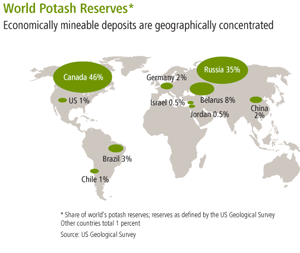Emerson’s Eric Kuebler, a metals & mining industry manager for Fisher valves and instruments describes the importance of mining potash for the world’s food supply.
My last blog discussed the growing mining market in Quebec through its Plan Nord investment. However, this is not the only investments occurring in Canada. Aside from the oil sands in Alberta, the potash market in Saskatchewan is booming.
According to the United Nations, our planet welcomed its seven billionth person in early November. As the human population continues to climb, so will the need for food and water sources as these commodities become scarcer.
This is especially true in emerging markets. Not only are emerging markets’ populations increasing each day, but so are their appetites. The new middle and upper class in the emerging markets are applying additional pressure to a system already strained by the developed-world’s demand for food. This is where potash enters the quest for a solution.
Agricultural fertilizers are comprised of three major ingredients: Nitrogen (N), phosphate (P) and potash (K). Naturally, proper fertilization leads to better crop yields, and maximizing yields is the best way to combat shortages of wheat, grains, and other agriculture products. In short, potash is vital to global food security.
Potash-bearing rock deposits occur in many regions of the world and are derived from minerals in ancient seas that dried up millions of years ago. High-quality and economically mineable potash deposits are geographically concentrated in 12 countries with Canada, Russia and Belarus accounting for over two thirds of global capacity and almost 90 percent of estimated reserves. Saskatchewan has almost half of the world reserves and 35 percent of global capacity, making it a hot spot for future potash investments.
Because of potash’s use in fertilizers, the global food supply challenge seems hinged by the ability of mining companies that have the ability to get greenfield potash projects off the ground.
However, potash production is difficult to take up and is incredibly risky due to the significant cost required to establish new sources of supply. One estimate puts the cost to develop a conventional two million metric ton greenfield mine and mill in Saskatchewan at more than $4 billion USD. This makes it difficult for new entrants. Conversely, due to established companies’ inherent knowledge and technology, a larger opportunity for future expansions and greenfield mines for growth now exists.
Newcomers like Brazil’s Vale and British/Australian Rio Tinto Group have plans to build-out their potash businesses. And one cannot overlook BHP Billiton (BHP), the largest mining company globally, investing over $10 billion in its Jansen project, which is set to produce 8 million metric tons per year for 70 years and will be the world’s largest potash operation. This is an obvious commitment by BHP in developing a world-class potash business in the province.
Meanwhile, existing operators Mosaic, Agrium and Potash Corp of Saskatchewan (PCS) are mid-way through $13 billion in spending to expand Saskatchewan’s current 10 producing mines. PCS in particular, the world’s largest fertilizer company by capacity, is responsible for about 20 percent of global potash capacity. This global company strives to meet the growing challenge of feeding the world’s population, and makes this happen through additional investments into their already established mining locations in Saskatchewan. As stated by their CEO Bill Doyle, “Putting food on the table is always a priority in North America, but more significantly for people in developing countries.”
Maintaining the food supply for a growing global population will remain a challenge. However, pun intended, everyone wants a piece of the pie when trying to sustain and feed the world. Thanks to the investments and technologies of these mining companies, potash will help to sustain our agriculture needs for global sustenance in the near term.

